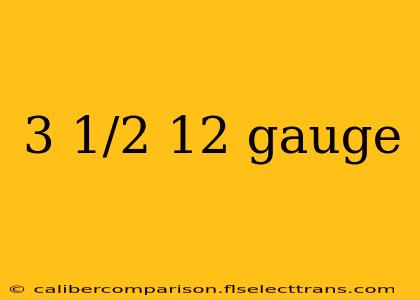Decoding the Mystery: What Does "3 1/2, 12 Gauge" Mean?
For those unfamiliar with shotguns, the term "3 1/2, 12 gauge" might seem like a cryptic code. It actually refers to a specific type of shotgun shell, describing its power and size. Understanding this terminology is crucial for hunters, sport shooters, and anyone interested in the world of shotguns. This post will break down exactly what these numbers mean and explore the implications for choosing the right ammunition.
Understanding Gauge: The Bore Diameter
The "12 gauge" part refers to the shotgun's bore diameter. Gauge is an inverse measurement: the lower the number, the larger the bore. A 12-gauge shotgun has a bore diameter that would accommodate 12 lead balls, each weighing one pound. Therefore, a 10-gauge shotgun would have a larger bore than a 12-gauge, and a 20-gauge would be smaller. This directly impacts the size and amount of shot the shell can hold.
Deciphering the 3 1/2: Shell Length and Power
The "3 1/2" indicates the shell's length, specifically in inches. A 3 1/2-inch 12-gauge shell is significantly longer than standard 2 3/4-inch or 3-inch shells. This extra length allows for a larger powder charge and more shot, leading to considerably more power and range.
Implications of 3 1/2-inch 12-Gauge Shells
The increased power and range of 3 1/2-inch 12-gauge shells offer significant advantages, but also come with drawbacks:
- Greater Stopping Power: Ideal for hunting larger game, where a quick, clean kill is paramount. The increased energy ensures a wider effective range and greater penetration.
- Increased Recoil: The higher power translates to significantly more recoil. This is crucial for shooters to consider, as managing the recoil is essential for accuracy and safety. Experienced shooters might find it manageable, but beginners might find it challenging.
- More Expensive: 3 1/2-inch shells are generally more expensive than standard-length shells. This is due to the increased material costs and manufacturing complexity.
- Weapon Compatibility: Not all 12-gauge shotguns are designed to handle 3 1/2-inch shells. Attempting to fire these shells in a shotgun not rated for them is extremely dangerous and could cause serious damage to the firearm and injury to the shooter. Always check your shotgun's manual to confirm its compatibility.
- Legal Restrictions: In some jurisdictions, there may be legal restrictions or limitations on the use of 3 1/2-inch shells, particularly for hunting certain species.
Choosing the Right Ammunition: Consider Your Needs
The choice of whether to use 3 1/2-inch 12-gauge shells depends entirely on the application. For hunting large game at longer ranges, the increased power is beneficial. However, for smaller game or for shooters who are sensitive to recoil, a shorter shell might be a better option. Always prioritize safety and ensure your firearm and ammunition are compatible. Consult your firearm's manual and seek guidance from experienced shooters before using high-powered ammunition.
Disclaimer: This information is for educational purposes only. Always consult the manufacturer's instructions and practice safe firearm handling techniques. Improper use of firearms can lead to serious injury or death.

